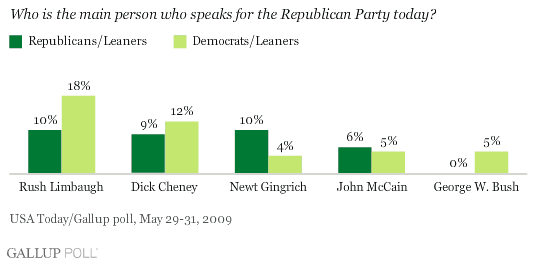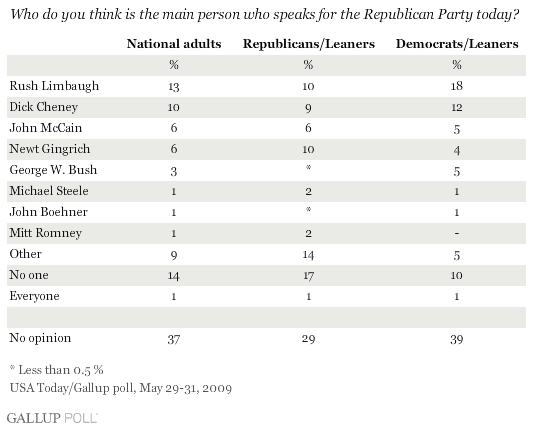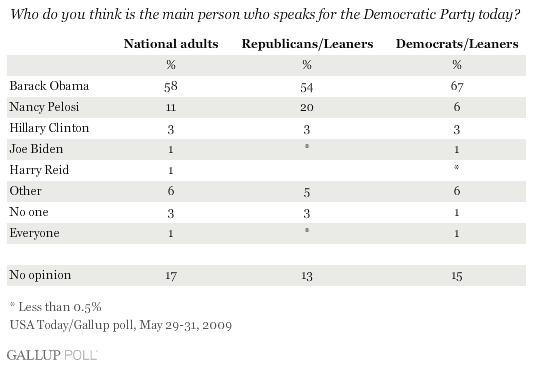PRINCETON, NJ -- Asked to name the "main person who speaks for the Republican Party today," Republicans across the country are most likely to name three men: Rush Limbaugh, Newt Gingrich, and Dick Cheney. Democrats are most likely to say Limbaugh speaks for the GOP, followed by Cheney. Both Republicans and Democrats overwhelmingly say Barack Obama is the main person who speaks for the Democratic Party, although Republicans are significantly more likely than Democrats to mention Speaker of the House Nancy Pelosi.

These results are based on an open-ended question included in a May 29-31 USA Today/Gallup poll. It comes as the Republican Party is attempting to regroup after losing last November's presidential election, and is looking for ways to reorganize and strengthen in time for the 2010 midterm elections.
The responses to the Republican leadership question provide hard evidence that there is in fact a significant leadership vacuum confronting the GOP today. Forty-seven percent of Republicans and Republican-leaning independents could not come up with a single name in response to the party spokesperson question. In contrast, a much lower 17% of Democrats could not name an individual as the person who speaks for their party.

Additionally, no one person dominates even among Republicans who are able to name someone who speaks for their party. Radio talk-show host Limbaugh, former Speaker Gingrich, and former Vice President Cheney -- although at the top of the list -- are all mentioned by only 9% or 10% of Republicans. The only other individuals named by more than 1% of Republicans are Sen. John McCain at 6%, Republican National Committee Chairman Michael Steele at 2%, and former Massachusetts Gov. and presidential candidate Mitt Romney, also at 2%. Of notable interest is the fact that less than 1% of Republicans name George W. Bush in response to the question. This reflects at least in part that Cheney has been highly visible and outspoken since leaving office, while Bush has largely remained silent, publicly.
Democrats are most likely to name Limbaugh as the person who speaks for the Republican Party (18%). Since Limbaugh is not a popular person with Democrats, the frequency with which Democrats name him is no doubt a negative characterization of the GOP from those who identify with the rival party. The talk-show host is followed on Democrats' list by Cheney at 12%, then McCain and Bush at 5% each. Gingrich is apparently not on the Democrats' radar as much as he is on Republicans'; the former speaker receives 4% mentions from Democrats, compared to the 10% mentions he receives from those who identify with his own party. (This past Monday, Republicans gathered for a House and Senate campaign committee fund-raiser in Washington, and Gingrich gave the keynote address.)
Democrats have little difficulty in naming the individual who is the main person who speaks for their party -- Obama, mentioned by 67% of Democrats. Six percent of Democrats name Pelosi, and 3% Hillary Clinton.

Republicans are also most likely to name Obama as the main spokesperson for the Democrats. But 20% of Republicans name Nancy Pelosi. Recent Gallup polling shows that Pelosi is highly unpopular with Republicans, suggesting that, just as a number of Democrats are happy to characterize the GOP (presumably in a negative way) as being led by Limbaugh, a number of Republicans are just as happy to characterize the Democrats as being led by Pelosi.
Discussion
While being associated with the party of the sitting president gives the Democrats a natural advantage over the Republicans in having a well-defined person representing them, these data clearly underscore the leadership vacuum that confronts the Republican Party today. Almost half of those who identify with or lean toward the GOP cannot think of a single political or other figure when asked to name the main person who speaks for their party. And none of the three individuals whom Republicans name -- Limbaugh, Cheney, and Gingrich -- would likely be characterized as new visionaries or individuals bringing a fresh or new face to the Republican political scene. None of the three hold elective office at this time, all are older white males (the youngest of the three is Limbaugh, who is 58), and only one has a realistic chance of running for the presidency in the future (Gingrich).
Perhaps most importantly, none of these is mentioned by more than 10% of Republicans, a telling indication that rank-and-file Republicans today simply have no single consensus leader around whom they can gather their forces.
Most pundits and political observers already have a list of possible candidates who could end up battling for the 2012 Republican presidential nomination -- including (in addition to Gingrich) Sarah Palin, Romney, Mike Huckabee, Charlie Crist, and Jeb Bush. Gingrich is the only one on this list who is mentioned by more than 2% of Republicans as the person who -- at this point in time -- speaks for their party.
Survey Methods
Results are based on telephone interviews with 1,015 national adults, aged 18 and older, conducted May 29-31, 2009. For results based on the total sample of national adults, one can say with 95% confidence that the maximum margin of sampling error is ±3 percentage points.
Interviews are conducted with respondents on land-line telephones (for respondents with a land-line telephone) and cellular phones (for respondents who are cell-phone only).
In addition to sampling error, question wording and practical difficulties in conducting surveys can introduce error or bias into the findings of public opinion polls.
